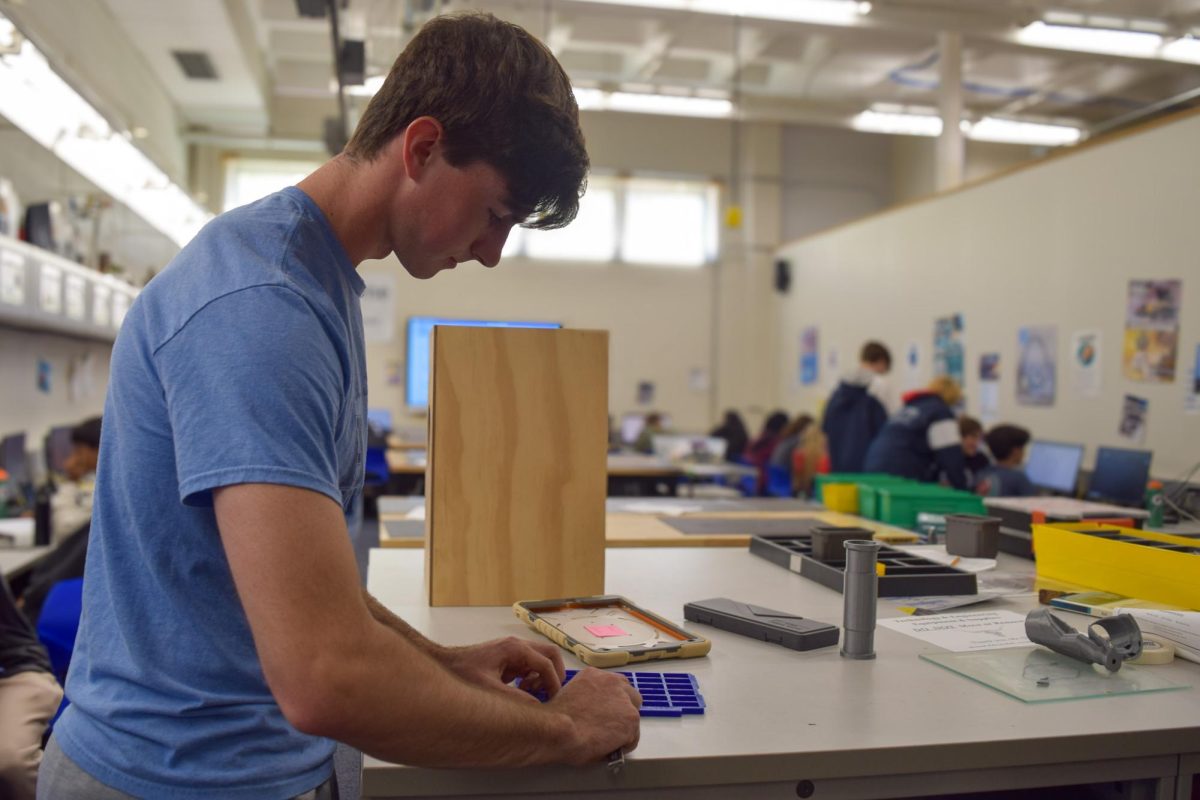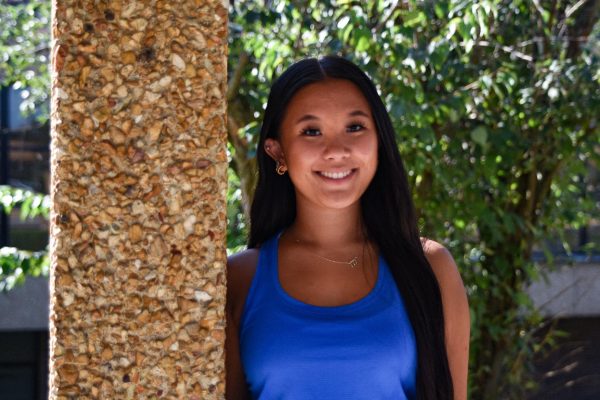Soaking in the fresh air of a warm Japanese morning, sophomore Jade Senseney is one of the many students attending West who visits family across the globe. The month of May is a month of commemorating Asian Americans and Pacific Islanders (AAPI) worldwide, aiming to celebrate the heritage and cultural contributions.
Senseny is of Japanese heritage and often visits where her mother grew up in Kichijoji, Japan. Her mother moved to the U.S. during her junior year of high school, and Senseney’s dad grew up in Saint Louis.
“While we are [in Japan], we visit my grandparents, uncles and friends of my mom. My favorite part [of traveling to Japan] is either trying different foods not available in the U.S. or traveling around Japan and seeing different landscapes and people,” Senseney said.
Due to the pandemic, Ren hasn’t been able to visit her maternal family in Handan, China. Her father is from Shijiazhuang, China. Taking in the bustling streets, sophomore Angie Ren explores the early morning life of China with her grandfather.
“Visiting China is always something I look forward to. The community in my parents’ hometown is always so welcoming, and it’s nice to get a change of scenery. There’s no words to describe it there; you’d have to go and visit it yourself, but it’s absolutely beautiful,” Ren said. “Every morning, I would go out onto the streets with my grandpa and buy food from the street market carts. I’d then ride with him on his motorcycle to different supermarkets. Everything is always so close to each other, and we wouldn’t even have to drive for a mile and be next to a nice park or restaurants and supermarkets. At night, the streets are so lively. There’s people playing music on their boomboxes, and everyone’s laughing and dancing in traditional outfits and selling food and accessories on the streets.”
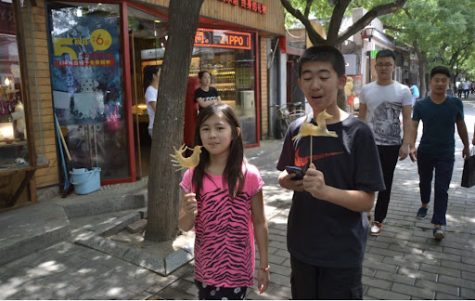
As COVID-19 rose, racial attacks on Asian Americans across the world increased. Asian Americans have reported being spat on, called racial slurs and being physically attacked in the last two years.
“I have encountered racism and grown to ignore it, but COVID-19 made things worse. I had a few rude comments at the beginning of the outbreaks,” Senseney said. “When someone’s racist towards me, it hurts, but it shows more about their character. I feel that racist behavior stems from immaturity and lack of exposure to the world.”
Ren has experienced this racism.
“When COVID-19 started, I remember hearing someone say I had started COVID-19 from eating bats and blamed it on me. I have been called racial slurs before as jokes. Racial slurs have become normalized. I remember reading comments on TikTok, and people talked about how it was okay to say Asian racial slurs, which is not right at all. It should never be okay to call others slurs just for the fun of it,” Ren said.
Leader of Asian Based Celebration (ABC) club sophomore Suraiya Saroar hopes to bring awareness to racism in schools by talking to people about their experiences and shedding light on issues that are underrepresented.
“West is an amazing school because of how diverse it is. I don’t think Asians are represented enough, [so] the club was created. While there isn’t any discrimination happening, there isn’t any specific appreciation, which is important, especially after the increase in racism against Asians due to COVID-19,” Saroar said. “Not only do we teach others about cultures, but we focus on Asian advocacy. We hope to talk to other people who can share their experiences to spread awareness for [underrepresented] issues.”
Despite both being AAPI students, Ren and junior Samarth Samal have different cultures and celebrate different Asian holidays. Samal has extended family in India, and he tries to visit them every other year.
“I celebrate my culture in many ways, including participating in Diwali [and Holi. We] light up fireworks and join in prayer. Holi is throwing colored powder at other people and eating the many dishes my culture has to offer,” Samal said. “It hurts because I can’t relate to many other people [who] get to see their grandparents or cousins every couple of months, while for me it’s every other year. Something that I enjoy about India though is how authentic the food is. The flavor in the food is 10 times more prominent, making it all the more delicious and satisfying when I do eat it.”
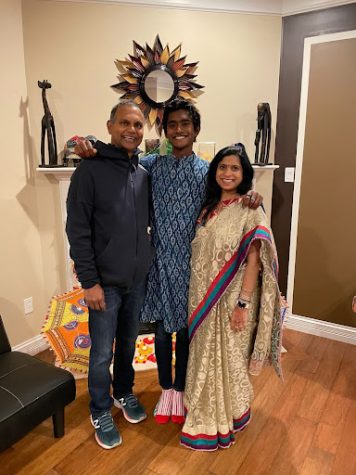
“For Chinese New Year, we usually invite our family and friends over, and my grandparents have a big feast. We usually spend most of our time making rows and rows of dumplings and traditional Chinese dishes. My grandparents give me my brother red pockets or red envelopes with money, which is seen as good fortune. We don’t get to keep it, though, and it’s usually put into our college funds. After dinner, we played a Chinese game called Ma Jiang,” Ren said.
Ren cooks traditional Chinese foods and takes part in Chinese traditions.
“I’ve grown to be proud of my culture and love every aspect of it since Asian culture is beautiful and unique in its ways. Though it can be so annoying at times to take time out of my day to do extra Chinese homework, it’s so worth it in the long run because it has not only forced me to learn more about my culture but it will also benefit me in the future when I revisit China,” Ren said.
Senseney attended a Japanese school every Saturday as an adolescent.
“Growing up as an Asian American has opened my world a bit more than others around here. I’m very grateful for that. It makes me incorporate different perspectives into my life,” Senseney said. “I was raised bilingual. I dreaded going to [Japanese] school on the weekends, but I’m very thankful for the opportunities and experiences it provided for me.”
Samal celebrates Asian and American culture, such as the Fourth of July, Christmas, Diwali and Holi.
“Being an Asian American has influenced me in a multitude of ways, including how I should approach my academics to the best of my ability, as that’s what my parents have always hounded me about, what kind of food and drinks I’ve grown to like and just who I am as a person overall,” Samal said.


![Sophomore Jade Senseney poses with her brother, sophomore Kayden Senseney and her mother, before attending the Missouri Botanical Gardens Japanese festival. Senseney’s mother wears a Yukata [a traditional summer kimono] as Senseney and her brother wear their Japanese school shirts. “One thing that brings me joy about my heritage and culture is going back to Japan and taking in how others’ lives are, how my grandparents live and understanding their way of life and what’s important to them,” Senseney said.](https://pwestpathfinder.com/wp-content/uploads/2022/05/new.jpg)
![Focused on providing exceptional service, sophomore Darsh Mahapatra carefully cleans the door of a customer’s car. Mahapatra has always believed his customers deserve nothing less than the best. “[If] they’re trusting us with their car and our service, then I am convinced that they deserve our 100 percent effort and beyond,” Mahapatra said.](https://pwestpathfinder.com/wp-content/uploads/2025/10/DSC_0018-1200x800.jpg)
![Sophomore Aleix Pi de Cabanyes Navarro (left) finishes up a soccer game while junior Ava Muench (right) warms up for cross country practice. The two came to Parkway West High School as exchange students for the 2025-2026 school year. “The goal for the [exchange] program is to provide opportunities for both Parkway students and our international exchange students to learn about other cultures, build connections and become confident, capable, curious and caring — Parkway’s Four C’s — in the process,” Exchange Program Lead Lauren Farrelly said.](https://pwestpathfinder.com/wp-content/uploads/2025/10/Feature-Photo-1200x800.png)

![Gazing across the stage, sophomore Alexis Monteleone performs in the school theater. The Monteleone family’s band “Monte and the Machine” has been releasing music since 2012, but Alexis started her own solo career in 2024 with the release of her first single, Crying Skies. “My whole family is very musical, [and I especially] love writing [songs with them],” Monteleone said.](https://pwestpathfinder.com/wp-content/uploads/2025/09/DSC7463-1200x798.jpg)
![Amid teaching a lesson to her AP Calculus BC class, Kristin Judd jokes alongside her students in their funny remarks. Judd has always enjoyed keeping the mood light in her classroom, along with on the volleyball court. “[I enjoy] that side talk where you see [or] overhear a conversation and chime in, or somebody says something funny,” Judd said.](https://pwestpathfinder.com/wp-content/uploads/2025/09/image-1200x730.jpg)
![Eyeing the ball, junior Ella McNeal poses for her commitment pictures at Clemson University. McNeal’s commitment comes after months of contact with top Division 1 soccer programs. “ It has taken a lot to get to where I am, but I know that [what] I've already been through is just the beginning, and I can't wait for what is to come,” McNeal said.](https://pwestpathfinder.com/wp-content/uploads/2025/09/IMG_4926-1200x900.jpeg)

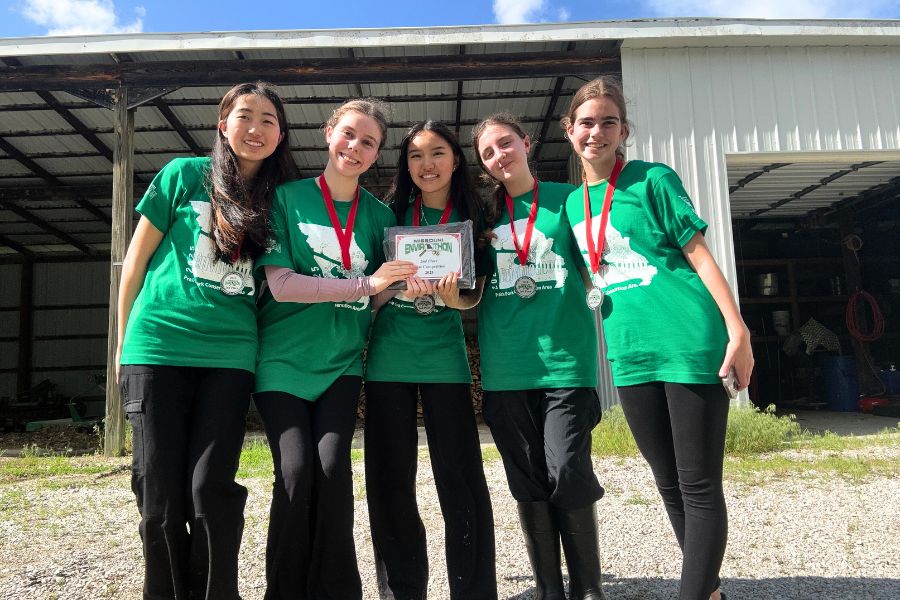
![Senior Adam Zerega stands with senior Dexter Brooks by farm equipment. Zerega often worked with friends and family on his farm. “I've been able to go to my family's farm since I was born. I [spend] at least three weekends a month [on the farm], so I'm there all the time,” Zerega said.](https://pwestpathfinder.com/wp-content/uploads/2025/04/IMG_4872-1200x900.jpg)
